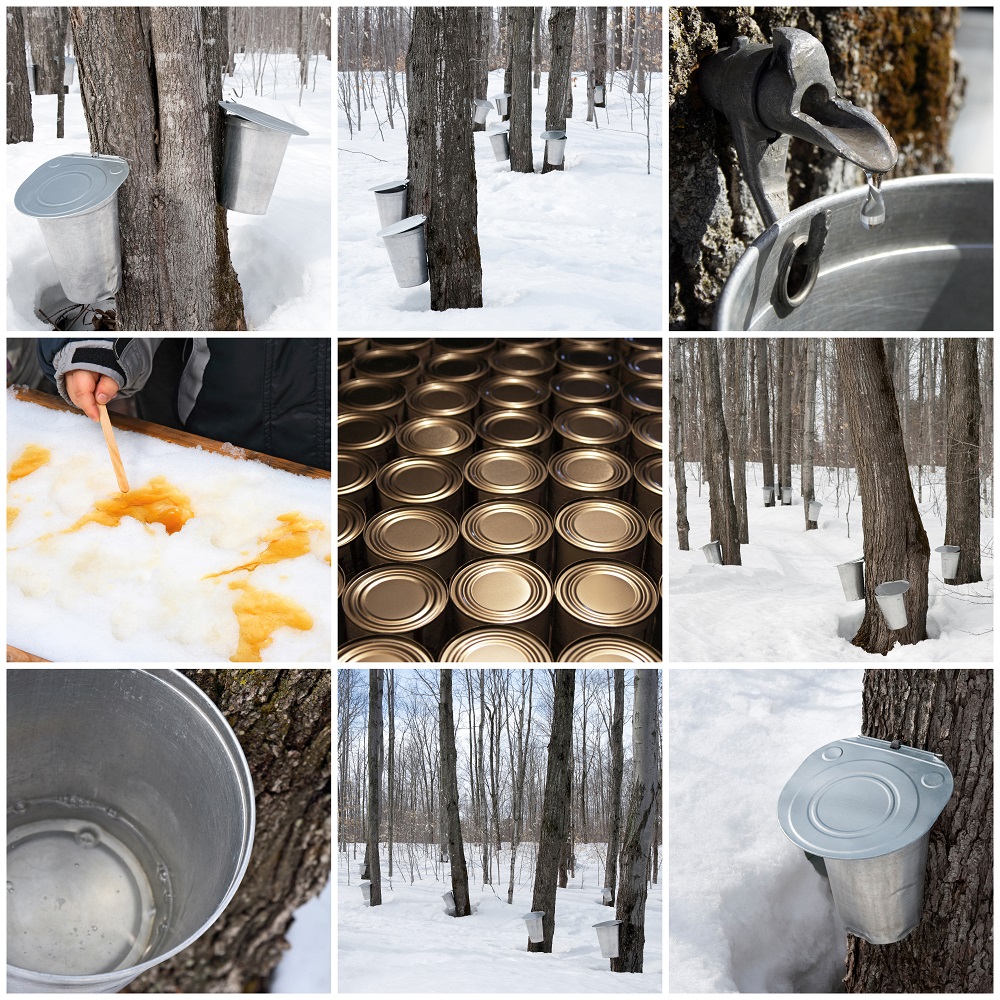Maple syrup is produced from the sap of several species of maple (Acer genus) such as sugar maple, red maple, or black maple (1). Different legends narrate the origins of maple syrup, but the consensus is that it was first produced in North America. While maple syrup can be added to anything, it is commonly used as a condiment for pancakes, waffles, oatmeal, porridge, or French toast. Most (85%) of the world’s maple syrup is made in Canada and the remaining 15% is made in the US.
By itself, maple syrup should be perfectly vegan as it simply consists of the xylem sap extracted from a maple tree. Thus, vegans can enjoy maple syrup as a vegan sweetener – especially 100% maple syrup products. However, vegans should be wary of some products that contain additives. Some maple syrup products are not 100% made of maple syrup and in fact contain additional ingredients that affect the taste and quality. It is important to look out for those products because some additives are not vegan.
Maple syrup production does not occur year-round because of an important factor: temperature. Maple trees store excess food in the form of sap at the base during the autumn and winter months. However, the sap from the base of the tree begins to flow once more as spring approaches. It is said that the best time to collect the sap is when the temperatures are above freezing during the day but below freezing at night.
Traditionally, a hole is drilled into the tree to access the maple tree’s xylem – the vessels where the sap flows through. Only trees with diameters of over 10 inches are chosen to be tapped. Trees with diameters of 10-20 inches only have one tap while larger trees can have more.
A plastic or metal tap is then inserted into the tree to aid in the sap extraction. The traditional methods of maple syrup production include simply hanging a bucket by the tap to collect the sap over time. The sap is then heated to boil off the water, producing pure maple syrup.

However, modern methods have been developed to expedite the processes and use less resources at the same time. Nowadays, it is not uncommon to find these maple syrup farms, or sugarbushes, equipped with extensive networks of tubing. Instead of collecting the sap from individual trees into buckets, using a network of tubes can reduce the labor needed as the sap can then be transported by the tubes directly to a central collecting tank.
Modern methods also include subjecting the raw maple sap to reverse osmosis, a process performed by a specialized machine that helps remove water from the sap. Reverse osmosis is said to remove about 50-70% of the water in the sap. The sap is still heated afterward to boil off the remaining water. However, less boiling time and fuel are needed due to the help of reverse osmosis.
Once the water is totally removed, the resulting pure maple syrup is filtered to remove other impurities and then graded. There are certain parameters that have to be achieved for maple syrup to be classified as grade A maple syrup. The grade A maple syrups are further divided into four categories: golden color with a delicate taste, amber color with a rich taste, dark color with a robust taste, and very dark color with a strong taste. Anything that does not reach the grade A level is considered substandard.
Pure maple syrup is completely vegan and is an effective alternative sweetener for vegans, especially those who are looking for vegan alternatives to sugar that is often considered a gray area ingredient among vegans. Compared to table sugar, maple syrup is an excellent alternative because it contains a wide variety of additional nutrients such as vitamin B1 (thiamine), vitamin B2 (riboflavin), vitamin B3 (niacin), vitamin B5 (pantothenic acid), vitamin B6, choline, calcium, iron, magnesium, manganese, and zinc.
However, it is still important to check the product labels. Maple syrup bottles that are labeled to be made of 100% maple syrup are probably vegan. Bottles that do not claim to be made of 100% maple syrup should be investigated further because some companies would actually include additional ingredients that can potentially turn the maple syrup non-vegan.
During the maple syrup production process, a large amount of foam can sometimes be produced when the maple syrup is being boiled to remove the water. Some maple syrup companies would add certain defoamers to prevent this from happening. Fats and lipids are commonly used defoamers in the industry. While organic certified companies would use vegetable oils for this process, some companies can use animal fats instead. This is a serious issue because these ingredients are not listed on the end product label.
Additionally, some maple syrup companies would even add more sugar to their maple syrup as a way to create sweeter products. While sugar is a product that comes from plants as well, there are certain production processes that can make sugar non-vegan. The reason why sugar is considered a gray area ingredient is that some sugar companies would use bone char to filter the sugar in further refinement processes (2). Although bone char is a cheap and effective filter, sugar refined with bone char cannot be considered vegan since bone char is an animal product – the charred bones of animals.
It is always important for vegans to check the product labels and ingredient lists of products to avoid overlooking certain details. While it is logical to assume that maple syrup is vegan, there are some companies that would actually add more ingredients to enhance the flavor. These ingredients can include dairy and butter. When these ingredients are added, the maple syrup can no longer be considered vegan.
References
